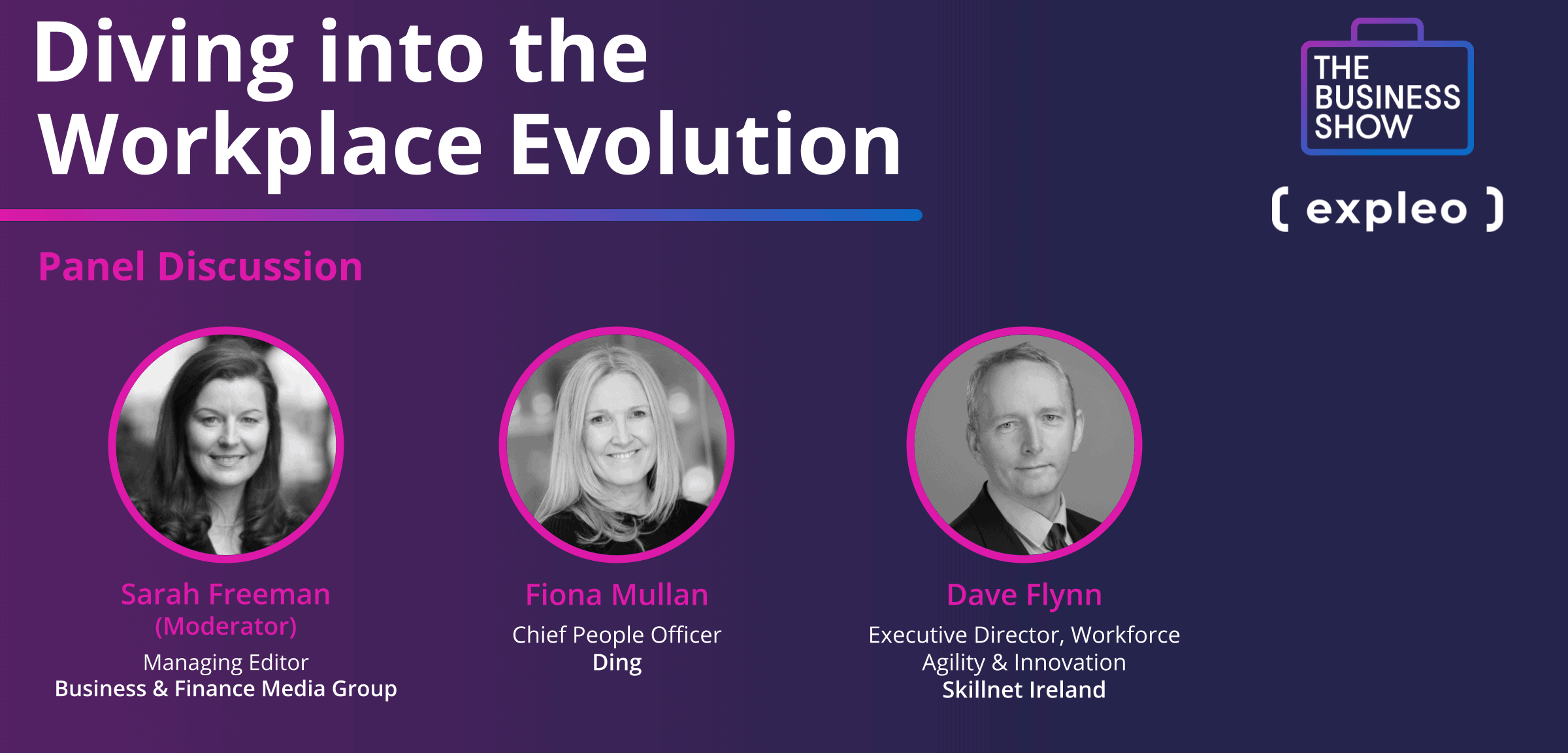The first in a series of events for The Business Show 2021 took an in-depth look into the Workplace Evolution experienced across all sectors over the past year
The first in a series of events for The Business Show 2021 broadcast yesterday, Thursday, 11th March, and took an in-depth look into the Workplace Evolution experienced across all sectors over the past year. Titled ‘Diving into the Workplace Evolution,’ this webinar explored how business leaders can adapt and build their business strategies in a time of change.
Panelists included Fiona Mullan, Chief People Officer, Ding; and Dave Flynn, Executive Director, Workforce Agility & Innovation, Skillnet Ireland. The panel was hosted by Sarah Freeman, Managing Editor of the Business & Finance Media Group.
This panel of industry experts touched on a number of core areas associated with the Workplace Evolution, including: Digital Transformation & Remote Working, Digital Skills, Operations & Productivity, Equality and Inclusion (DE&I), and Employee Wellbeing.
The Business Show 2021 is the second in a series launched by the Business & Finance Media Group. It is designed to help guide businesses through challenging times with a view to emerging stronger and more agile.
The Business Show begins in March with the first of a series of virtual events and will culminate with the Rebooting Ireland Virtual Summit in April 2021. This will be an interactive online event including live keynotes, panel discussions, networking and opportunities to share digital content.
This webinar is available to view on demand here. Below are five key takeaways from the event.
The integration of ‘work us’ and ‘home us’ is here to stay
Fiona Mullan, Chief People Officer, Ding, spoke extensively about the benefits remote working has introduced to the culture of work. “We have accelerated to a pace of change that brings companies to a level playing field,” she said. However, “we’ll probably go through a normalising period soon after when we begin to open offices.”
Ms Mullan noted that we have seen an integration of ‘work us’ and ‘home us’ as a result of increased digitisation and work from home models. “That’s been a pleasure to see,” she said. “There has been a long history of us rocking up to work having to leave that more human aspect of ourselves and our family needs and all of our other interests behind. That has been very much integrated in a speedy way.”
Ms Mullan sees this as a change that is here to stay, as workers are now relishing the opportunities and flexibility that comes with it.
The purpose of the office will shift
While noting that some employers will choose to retain a work from home model into the future, Ms Mullan suggests that those who wish to incorporate a hybrid model between home and office work will see the role of the office shift. “The office will take on a different form, moving away from what it has been, which is essentially a desktop experience … I think the purpose of the office will shift to being very much in service of team-based work and collaborative work.”
Individual work, Ms Mullan says, can be done at home.
Think about business strategy first before considering tech
Dave Flynn, Executive Director, Workforce Agility & Innovation, Skillnet Ireland, spoke about strategies businesses can incorporate into their plans to ensure viability into the future. “One of the things we come across when we deal and work with businesses – maybe SMEs in particular – is that they’re a little bit daunted by the digital transformation piece,” he said.
“They hear about it a lot, they know it is something that they must give consideration to, but are naturally concerned about making investments in digital technologies that fail … First and foremost: It is not thinking about the tech piece first, but thinking about the business and the strategy for the business, where it is going to be headed in the years to come … Once you have a strong strategy in place, that’s your anchor, then you can begin to figure out the digital transformation journey.”
An altered hierarchical structure can achieve faster change
Ms Mullan was asked about the change in hierarchical structures that has come about in some workplaces as a result of COVID-19 and work from home models. “The experience of COVID has accelerated changes that were already afoot … There has been a lot of discussion and research around how you build your agile organisation.
“In a way, moving away from more traditional hierarchical structures has been offered as a route to that. You can respond with speed, information travels fast, you involve everybody in the big decision making.”
It is important to continue to lure investment into Ireland in a post-COVID world
Mr Flynn was asked about the potential drawbacks of increased remote working. “Companies might be looking to Ireland and saying, ‘do we need to locate there?'”, he said. “Or they might be saying to themselves, ‘we have an existing base here, do we need the same physical presence as before? The same level of investment? The same numbers of staff?’ In order to mitigate against that, we need to make sure we have very strong credentials.
“I’m going back to the sustainability agenda. To what extent are companies looking at that sustainability agenda and looking at their products and services, they way they manufacture goods, the way that they export them, and so on, and are those considerations being taken into their business to the greatest extent possible?”

